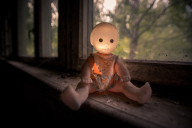Cezarija Abartis
Rapunzel and Mother Gothel
Behind her back, the villagers’ children called her Mother Gothel, though she was barren and was nobody’s godmother. She had been pretty enough in her youth, decades ago; the boy she loved died in the wars. She had been named after a beautiful aunt but finally herself answered to Gothel. She knew about herbs and plants and sold them to the villagers if they had toothaches or coughs. Caraway was for a fever; chamomile was for labor pains, fennel was for eye diseases. She even knew of a potion that would help a woman conceive; it did not always work, but sometimes it did.
One of the villagers, Heidi, asked for this potion. Gothel was envious of Heidi’s happiness and health and husband. She sold her the potion, saying that she would have twins and must give Gothel the first child. Heidi agreed and soon she had a pregnant woman’s cravings for green salad just as she herself began growing life inside. But the life was a single lovely girl–there was no twin–and Gothel demanded the baby.
The sky darkened and Gothel screeched her request. Nearby, a tree turned purple in the zigzag light; a bird fell down; a wolf howled on the horizon. Heidi became feverish and tossed on her pallet. Her husband begged Gothel for a remedy, which she would not bring until he gave her the baby. He chose his wife over their newborn child.
Gothel named the baby Rapunzel, caressed her and dandled her in her lap and combed her hair. The two of them lived in a tall old house at the edge of town, on the very edge of the woods, surrounded by a thicket of thornbushes. Gothel sang a lullaby about protecting Rapunzel always: “Pitch her, Catch her, Let her never run away!” She tossed a golden ball to the golden girl; the girl giggled and threw back the ball. When Rapunzel was twelve, Gothel gave her a room by herself in the high attic right under the peak of the roof. Gothel told her to be careful about falling in love, that love was a grief, that the lover sooner or later left the beloved, but Gothel would love her always.
Rapunzel was happy to have her own room in the attic and chose pink sheets and soft rugs and airy, red curtains. It looked like the inside of a chicken, Gothel said and patted her hand. Rapunzel sang out the window while Gothel gathered herbs in the forest. Rapunzel grew into a restless young woman imagining all the happiness in the rest of the world--the joyful children, the singing and dancing, the paintings and embroidered pillowcases and hand towels--but Mother Gothel would not let her leave. A rich landowner’s son riding in the forest was drawn to Rapunzel’s voice. The clear tone rose toward the sky and curled around him. Rapunzel let down her hair, and he climbed up to the attic window. He visited her the next day as well, and the next.
Gothel cut Rapunzel’s hair, which was the harshest punishment that Gothel could inflict, though it was scarcely a disfigurement. Gothel hung Rapunzel’s long braid outside the window as a reminder of the girl’s disobedience and the pain she caused. Gothel looked out at the drought-beset world, the limp leaves and brown grass and recalled the young soldier she loved. One moonlit night Rapunzel ran away, intending to meet her beloved in the forest and elope with him, but the forest is as dense and mysterious as love, and somehow they did not meet. The young man climbed to her window, but without the warm love of his beloved, he slipped and fell into a bramble bush, which blinded him.
Alone in her house, Mother Gothel wept and remembered her given name. The sky flared purple; thunder boomed overhead. She searched for Rapunzel and, when she found her, gave her an ointment for her tears. The next day Mother Gothel held the hand of the youth as he tapped his cane on the forest path. Mother Gothel left the youth with Rapunzel and walked home. The storm made the forest green. Rapunzel’s tears healed the young man’s blindness.
Cezarija Abartis' Nice Girls and Other Stories was published by New Rivers Press. Her stories have appeared in Per Contra, Pure Slush, and New York Tyrant, among others. She participates on Fictionaut, ShowMeYourLits.com and Zoetrope.com. Her flash, “The Writer,” was selected by Dan Chaon for Wigleaf’s Top 50 online Fictions of 2012. “The Argument” was chosen by Beate Sigriddaughter as a runner-up for the Fourteenth Glass Woman Prize. “History,” published by The Lascaux Review, was chosen as April Story of the Month by The Committee Room. Drunk Monkeys chose her as Writer of the Month (August 2015). Recently she completed a novel, a thriller. She teaches at St. Cloud State University. Her website is magicmasterminds.com/cezarija.
